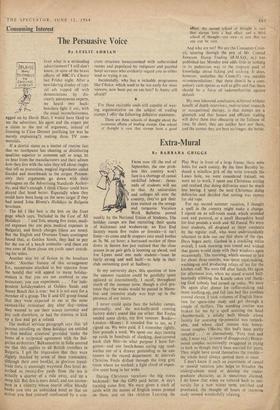Extra-Mural
By BARBARA GRIGGS
In my university days, this question of how the summer vacation could be gainfully spent agitated us intermittently, I recall, throughout much of the summer term; though a civil pre- tence that the weeks would be passed in blame- less and intensive study was kept up in the presence of our tutors.
I never could quite face the holiday camps, personally; and the not-badly-paid canning factory didn't sound like me either. But Foyles needed some clerks, my first summer. Books- London—Money: it sounded fine to me, so I signed on. We were paid, if I remember rightly, four pounds a week. We spent our days turning up cards in hundreds of clanking, dust-covered book club files—to what purpose I have for- gotten—and our lunch-hours eating egg sand- wiches out of a drawer pretending to be cus- tomers in the record department. At intervals Christina Foyle drifted through the long grey room where we worked; a light cloud of expen- sive scent hung in her wake.
During Christmas vacations the big stores beckoned: but the GPO paid better. A day's training came first. We were given a stack of cards with the names of English towns printed on them, and sat like children Learning the
Play Way in front of a large frame; there were holes for each county. By the time Burnley in-
duced a mindless jerk of the wrist towards the Lanes hole, we were considered trained; we were set to work. I spent one Christmas sorting and realised that doing deliveries must be much less boring. 1 spent the next Christmas doing deliveries and decided that sorting was money for old rope. For my second summer vacation, I thought a spell in the country might make a change. I signed on as still-room maid, which sounded cool and pastoral, at a small Hampshire hotel for four pounds a week and All Found. We were four students, all despised as inept amateurs by the regular staff, who were understandably reluctant to dole out our fair share of the tips. Days began early. Garbed in a crackling white overall, I took morning teas round and wished that guests would sleep with their windows open occasionally. The morning, which seemed to last for about three months, was spent toast-making, washing-up and producing relays of tea for the kitchen staff. We were Off after lunch, On again for afternoon teas, when we stood around half- heartedly nibbling the Kunzle cakes and thank- ing God nobody had turned up today. We were On again after dinner for coffee-making and more washing-up, and fell into bed like zombies around eleven. I took volumes of English litera- ture for spare-time study and got through a couple of thrillers. The numbing routine was broken for me by a spell assisting the head chambermaid, a solidly built blonde whose faculty for assessing tip-potential was remark- able, and whose chief interest was honey- moon couples. ('Ho-ho, this bed's been pretty rumpled . . .' or alternatively, 'Very neat and tidy, I must say,' in tones of disapproval.) Honey- moon couples occasionally swaggered in trying to look as though they'd been married for years, They might have saved themselves the trouble— the whole hotel always spotted them at once. I don't know if such an assortment of casual or menial vacation jobs helps to broaden the undergraduate mind or develop the under- graduate character, as is sometimes claimed. I do know that when we tottered back to uni- versity for a new winter term, enriched and prostrated, the thought of hours of intensive study seemed wonderfully relaxing.


































 Previous page
Previous page